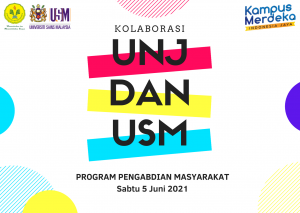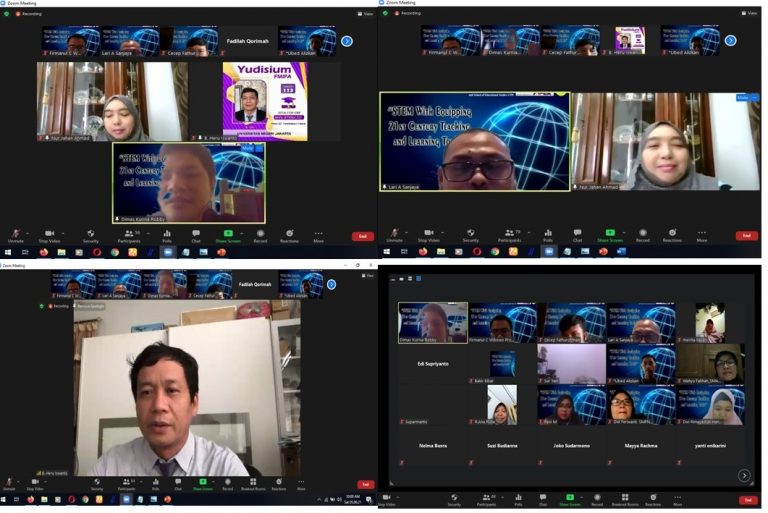UNJ and USM Collaborate to Organize Community Service Program

Community Service Program
June 5, 2021
The International Collaborative Community Services (ICCS) activity has been carried out: Dissemination of GOOPI (Game Open Online Physics Instructional) to Sparking Innovation in STEM Education for Facilitating 21st-Century Skills (21-CS) at the State University of Jakarta and Universiti Sains Malaysia which was initiated by Dr. Firmanul Catur Wibowo (FMIPA UNJ) and Dr. Nur Jahan Ahmad (University Sains Malaysia) held an international collaborative community service activity between Jakarta State University (UNJ) and Universiti Sains Malaysia (USM). This activity is a community service program carried out online using the zoom platform funded by LPPM UNJ.
This form of service is carried out by providing socialization and dissemination of GOOPI (open online physics instructional game) to trigger STEM education innovation in facilitating 21st Century skills to participants who are generally teachers spread throughout Indonesia.
There were 105 participants who attended the zoom session on Saturday (5/6). Firman, as the organizer of this activity, expressed his desire to be able to share and provide knowledge about how to use free platforms available on the internet to support learning innovations carried out by teachers in the classroom, this is intended to support 21st century technological skills. nowadays.
According to Firman, the course of the service was quite interesting with the opening speech delivered by Dr. rer nat. Bambang Heru Iswanto, M.Si as Coordinator of the Physics Education Masters Study Program hopes that similar international collaboration can continue to exist between UNJ and USM in the future. Then the MC was Dimas Kurnia Robby, M.Pd. who was straightforward in conveying the agenda up to the main session, namely the delivery of material by Dr. Nur Jahan Ahmad moderated by Lari Andres Sanjaya. M.Pd which lasts approximately 2 hours.
Dr Jay, as he is known, provides many interesting insights into learning, especially during the Covid-19 pandemic. Dr. Jay clearly conveyed several free platforms available on the internet to help improve the quality of learning so as to make students more interested in listening to the material presented by teachers in online classes. These platforms include: Canva, slidesgo, mentimeter.com.
The second day of training will include GOOPI dissemination. GOOPI is an online game media used for physics learning, especially the physics concept of microscopic phenomena, it can be accessed directly on the page https://goopi.id/ (use UC browser). This media was developed by a research team from the physics education master’s study program which is part of the Physics Education Research Agency (PER).
For the second day, the majority of participants were teachers, making up 70% of the total number of participants, the rest were lecturers and students who wanted to learn how to GOOPI. GOOPI was socialized so that it could be used for learning physics during the Covid-19 pandemic. It is hoped that after this dissemination training, the world of educational technology can be optimized for science or physics learning media by teachers and students for learning.
Digital Game Based Learning helps train digital native children’s brains to change to accommodate new technology. Digital games are a new thing in the world of education, because students are starting to learn through games. Apart from that, electronic games and simulations have started to become a necessity for learning in formal education. Apart from that, the millennial generation has arrived and has grown up and calls itself the ‘gaming generation’. The gaming generation that plays a lot of games absorbs information more quickly. Therefore, the game generation is also always oriented towards solving intellectual problems to support 21st century skills (Critical Thinking, Collaboration, Communication, and Creativity).
At the end of the event the committee selected several participants whose questions were interesting enough to be given merchandise. In closing, there are great hopes from the participants, organizers and Dr. Nur Jahan Ahmad hopes that similar collaborations that support teachers’ ability to teach in front of the class can continue to be held for teaching staff so that it will have an impact on students’ achievement and ability to understand what the teacher is saying. (RLS)

